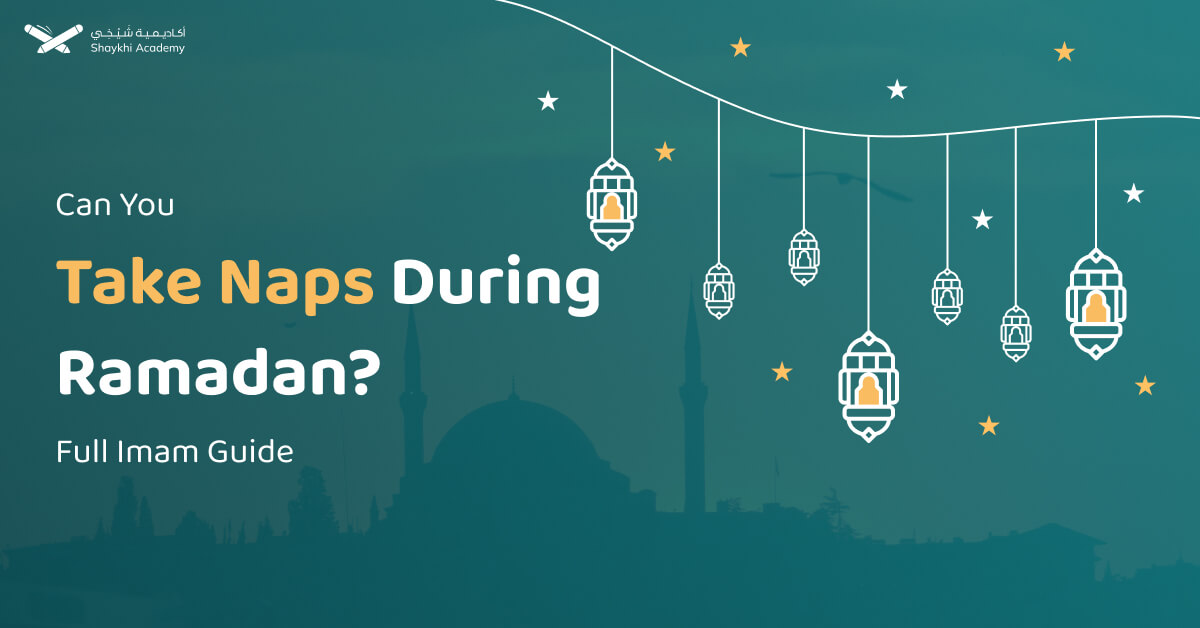Can you take naps during Ramadan? As the sacred month of Ramadan approaches, Muslims worldwide prepare for a period of fasting, prayer, reflection, and spiritual growth. However, with the change in daily routines and sleep patterns, many questions arise about the compatibility of fasting with sleep and naps. In this article, we explore taking naps during Ramadan, sleeping while fasting, and the times you should be awake during Ramadan.
Understanding the Concept of Napping “Qailulah” and Sleeping while Fasting
Napping during Ramadan, also known as “qailulah” in Islamic tradition, and sleeping while fasting refer to the act of sleeping and taking short periods of rest during the daylight hours of Ramadan while abstaining from food, drink, and other physical needs, to recharge and rejuvenate. While fasting, especially during long daylight hours, maintaining energy levels can be challenging. Napping offers a practical solution to combat fatigue and ensure individuals can continue with their daily activities, including prayers and other religious obligations.
Can You Take Naps During Ramadan?
Yes, you can take naps during Ramadan as long as they do not lead to negligence of obligatory acts such as prayers or other religious duties.
The Messenger of Allah, peace and blessings be upon him, said:
“When one of you dozes off while performing Salat, he should lie down till his drowsiness has gone away from him. When one of you performs Salat while dozing, he may abuse himself instead of seeking pardon (as a result of drowsiness).”
[Al-Bukhari and Muslim].
Taking naps during Ramadan is permissible and even encouraged if it helps maintain physical health and enhances one’s ability to perform religious duties. The Prophet Muhammad himself acknowledged the benefits of short daytime naps, known as “qailulah,” especially during times of heightened spiritual activity.
Anas ibn Malik reported: The Messenger of Allah, peace and blessings be upon him, said:
“Take a siesta, for Satan does not sleep in the midday.”
Hasan (fair) according to Al-Albani.
Also, Nafi’ reported: Ibn Umar, may Allah be pleased with him, would come to a tree between Mecca and Medina, and he would take a nap under it. He told people that the Prophet, peace and blessings be upon him, had done so. Source: Musnad al-Bazzār 1519. Grade: Hasan (fair) according to Al-Albani
Can You Sleep While Fasting?
Yes, you can sleep while fasting. Fasting during Ramadan does not prohibit sleeping at any time of the day or night. In fact, adequate sleep is essential for preserving physical health, cognitive function, and emotional well-being throughout the fasting period.
However, if there’s uncertainty about waking up in time, it is prohibited to sleep before performing the prayer. If a person chooses to take a nap due to exhaustion or drowsiness, it is permissible, but efforts must be made to ensure waking up on time, such as setting an alarm or asking family members for assistance.
It’s essential to prioritize performing prayers before engaging in other activities, including sleeping. As the Prophet Muhammad (peace be upon him) emphasized, the best action is to observe prayers promptly within their respective periods.
The Messenger of Allah (ﷺ) was asked: Which of the actions is best? He replied:
“Observing prayer early in its period.”
Sahih (Al-Albani)
What Time Should You Wake Up During Ramadan?
You should be awake during Ramadan at the times of the obligatory prayers, at the time of suhoor, and at the time of iftar. You should be awake during the times of the obligatory prayers so that you do not miss the time for prayers. Missing the time for prayer is a grave sin that should be avoided at all costs.
Allah says:
“Indeed, prayer has been decreed upon the believers a decree of specified times.”
(Al-Nisaa 4:103).
Waking up during Ramadan involves strategic planning to maximize the benefits of fasting while maintaining productivity and spiritual engagement.
Also, during Ramadan wake up before dawn (Fajr) to partake in the pre-dawn meal (Suhoor) and perform the pre-dawn prayer. Aim to wake up with ample time to consume a nutritious Suhoor and engage in spiritual reflection and prayer.
Anas reported God’s messenger as saying, “Take a meal a little before dawn, for there is a blessing in taking a meal at that time.” (Bukhari and Muslim).
Establish a consistent wake-up time throughout Ramadan to regulate your body’s internal clock and optimize productivity and spiritual devotion. Consistency fosters discipline and helps maintain a sense of routine during the fasting month.
Be flexible with your wake-up time based on individual needs and circumstances. Listen to your body’s signals and adjust your sleep schedule accordingly to ensure optimal rest and productivity during Ramadan.
Elevate Your Quranic Journey: Begin with Shaykhi Academy this Ramadan!
Transforming your relationship with the Qur’an this Ramadan is within reach. At Shaykhi Academy, we understand the challenges that often hinder this sacred journey, whether it’s the demands of work, household chores, or previous unsuccessful attempts at memorization. But fear not, because we’re here to help.
Founded in 2019 by a team of esteemed Quran Teachers, Shaykhi Academy is dedicated to bringing the teachings of the Quran to Muslims worldwide, right in the comfort of their own homes.
Ready to take the next step? Explore our courses and enroll today at Shaykhi Academy

Conclusion:
In conclusion, taking naps during Ramadan, known as “qailulah,” is not only permissible but also encouraged if it aids in maintaining physical health and enables individuals to fulfill their religious duties effectively. The Prophet Muhammad himself acknowledged the benefits of short daytime naps during times of heightened spiritual activity.
Similarly, sleeping while fasting is allowed, but it’s essential to prioritize waking up on time for prayers and other religious obligations. The best practice is to observe prayers promptly within their respective periods. Additionally, strategic planning for waking up during Ramadan involves ensuring one is awake for obligatory prayers, pre-dawn meals (Suhoor), and the breaking of the fast (Iftar).
Establishing a consistent wake-up time and being flexible based on individual needs are key strategies for optimizing rest and productivity during this sacred month. Moreover, individuals seeking to enhance their Quranic journey during Ramadan can benefit from enrolling in courses offered by Shaykhi Academy, which provides accessible and expert-guided Quranic education tailored to the needs of learners worldwide.

















































